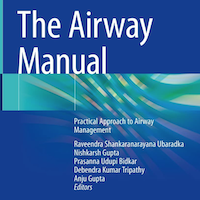
Effect of Nocturnal Sound Reduction on the Incidence of Delirium in ICU Patients
The incidence of delirium in ICU patients was significantly reduced after implementation of a nocturnal sound-reduction protocol. However, reported sleep quality did not improve. A significant difference in slope in the percentage... read more

Antipsychotics for Prevention and Treatment of Delirium
Delirium is a common, complex and costly condition in older adults. Every year, over 7 million hospitalized Americans suffer from delirium. A recent systematic review found that 31% of critical care patients have delirium,... read more

ICU Physiology in 1000 Words: Venous Doppler & Volume Tolerance
With the birth of "fluid responsiveness" physiology, there has been a slow and solemn drumbeat ushering the central venous pressure (CVP) up the squeaking planks of the hemodynamic gallows. Despite this, a few years ago... read more

Bedside Limited Echocardiography by the Emergency Physician Is Accurate During Evaluation of the Critically Ill Patient
Our study suggests that PEP sonographers are capable of obtaining images that permit accurate assessment of LVF and IVC volume. BLEEP can be performed with focused training and oversight by a pediatric cardiologist. We conducted... read more

Critical Care Nursing in Resource-Limited Environments
Critical Care Nursing in resource-limited environments is an emerging sub-speciality, currently centred on regions within sub-Saharan Africa and South-East Asia. The World Federation of Critical Care Nurses (WFCCN) continues... read more

My ICU Patient Lived. Is That Enough?
As many as one in three patients sick enough to require a ventilator might develop symptoms of post-traumatic stress disorder. Anxiety and depression are equally common, if not more so. Others survive critical illness but... read more

The Washington Manual of Critical Care
Prepared by residents and faculty at the Washington University School of Medicine, this pocket manual contains easy-to-read algorithms for the management of more than 80 medical and surgical problems arising in the intensive... read more

Transfers From ICU to Hospital Ward
Little is known about documentation during transitions of patient care between clinical specialties. Therefore, we examined the focus, structure and purpose of physician progress notes for patients transferred from the intensive... read more

Stress Ulcer Prophylaxis in ICU Patients Receiving Enteral Nutrition
Our results suggested that in patients receiving enteral feeding, pharmacologic SUP is not beneficial and combined interventions may even increase the risk of nosocomial pneumonia. We searched PubMed, Embase, and the Cochrane... read more

The Overlooked Danger of Delirium in Hospitals
The condition, once known as "ICU psychosis," disproportionately affects seniors and those who have been heavily sedated—and the delusions can last long after they're discharged. Patients treated in intensive-care units... read more

Do We Need New Trials of Procalcitonin-Guided Antibiotic Therapy?
Using biomarkers as a guide to tailor the duration of antibiotic treatment in respiratory infections is an attractive hypothesis assessed in several studies. Recent work aiming to summarize the evidence assessed the effect... read more

Lower ARDS Mortality at High-Volume Intensive Care Units
For patients with acute respiratory distress syndrome (ARDS), mortality is lower in high-volume intensive care units (ICUs), according to a study presented at the annual meeting of the American Thoracic Society. The researchers... read more

Critical Care Echocardiography: A Certification Pathway for Advanced Users
Though the details are still being finalized, the critical care NBE pathway will bear many similarities to the current certification process for cardiologists and cardiac anesthesiologists. In particular, the critical care... read more

Consensus Statement on Nutrition Screening and Therapy Within a Surgical Enhanced Recovery Pathway
Perioperative malnutrition has proven to be challenging to define, diagnose, and treat. Despite these challenges, it is well known that suboptimal nutritional status is a strong independent predictor of poor postoperative... read more

Association Between Fluid Balance and Outcomes in Critically Ill Children
Fluid overload is common and is associated with substantial morbidity and mortality in critically ill children. Additional research should now ideally focus on interventions aimed to mitigate the potential for harm associated... read more

Dear hospital administrators: Please value your amazing nurses
Anyone who has worked in health care for any length of time, has seen situations erupt where nurses and administrations clash. I have seen this happen myself in many health care institutions, and almost every doctor I've... read more

Prompt Administration of Antibiotics and Fluids in the Treatment of Sepsis
We conclude that antibiotic therapy is highly time sensitive, and efforts should be made to deliver this critical therapy as early as possible in sepsis, perhaps extending into the first point of medical contact outside the... read more








